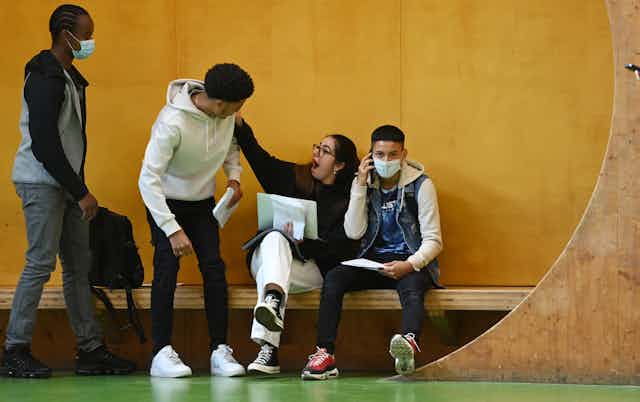The cancellation of exams due to the pandemic has meant that 2021 has been a year of hurried experimentation in school assessment. But despite claims of grade inflation under the temporary system deployed this year, it’s worth considering whether there is anything we can take away from this experience to improve things in the future.
This year’s A-level and GCSE results were decided via teacher assessment. They are being treated as an anomaly that must be rectified in future. But that denies the legitimate achievements of students and teachers. It will also impoverish the education of future generations if we fail to appreciate the merits of this year’s system. We should embrace the lessons of an assessment approach based on multiple forms of evidence of achievement over time.
Grade inflation is a term of moral panic, not fact. The idea that too many pupils have been awarded top grades perpetuates an elitist view of education that is not based on merit but on winners and losers. An increase in high marks does not prove grade inflation, unless we can also evidence that these grades are less deserved than previous years – that they are marked against lower standards or marked less rigorously.
To complain about “grade inflation” implies a desire to return to a system which artificially controls the number students who could achieve each grade. This doesn’t only mean a 9 or A is for the top percentage only; it also means some students must necessarily fail, regardless of their actual work. What sort of society insists some students must do badly?
Exam regulator Ofqual is clear that it does not have fixed caps on grade awards, but does predict grades based on past years’ performance. But the myth remains that an 9 or A should only go to an elite, rather than be based on evidenced achievement. There is widespread misunderstanding of the purposes of GCSEs and A-levels, and until these are dispelled we remain unable to see the educational lessons from this year’s approach.
What is the purpose of GCSEs and A-levels?
A-levels and GCSEs are qualifications of achievement against set criteria. This involves the use of absolute criteria for A-levels and “weak” criteria for GCSEs reflecting their more formative role.
Some argue that the current level of 9 or A grades is unsustainable because it makes it harder for employers and universities to choose between candidates. But that is not the purpose of a qualification and such arguments again perpetuate the idea that we should ration or cap grades rather than have them based purely on achievement.
How does assessment work?
Exams are considered by some traditionalists as the “gold standard” of robust and rigorous assessment. The head of Ofqual has made it clear he supports a return to exams, saying that they remain the best form of assessment. Putting aside arguments for and against exams, the real issue is whether a system dominated by them is more robust than one based on multiple forms of evidence. In research, for instance, we often use triangulation to ensure robust data. This is the process of having multiple types of evidence in order to ensure the robustness of results.

The strength of this year’s GCSE and A-level results is that they are based on a range of evidence of student learning. This removes the element of “luck” from performance in a single three-hour slot on a particular day. It recognises the diverse ways in which students may learn and show their learning. A wider range of skills are nurtured and students will generally have to demonstrate the ability to develop and apply knowledge in different ways. This also explains why we have seen improvements in girls’ level of achievements, because they do better under these conditions.
The detached exam board model of marking makes some sense for traditional exams. But when grading is based on a range of work, an important aspect of deciding the right grade is to understand the student’s trajectory against the criteria. Teachers have a unique role in understanding the sustained demonstration of learning at a certain level. And that has been at the heart of this year’s system. A caveat, however, is that teacher-assessment should be supported and resourced accordingly. This year was only achieved by teachers going above and beyond their normal duties. Teachers should also be protected from undue parental pressure.
Looking forward
This year’s assessment system was not perfect, but nor were those of previous years. When this year’s system is evaluated, we may find flaws in its execution. But the underlying logic is educationally sound. Assessment serves many purposes and they do not always align easily together. This year we have seen an alternative to exam-focused assessment. Multiple forms of evidence with teacher-grading should be considered seriously as a robust, educationally rich form of assessment.
This year’s students have been challenged in numerous and diverse ways to demonstrate and apply their learning. And they have done so during the toughest conditions of uncertainty and disruption. This is not a generation who should have their achievements discredited, but rather applauded and celebrated. And there is much to learn for future generations.

